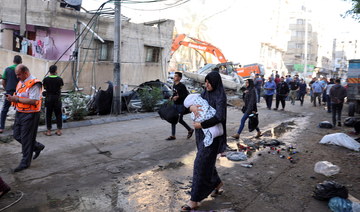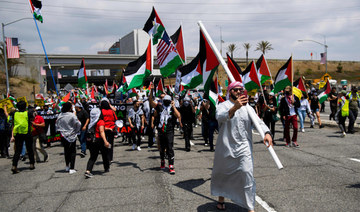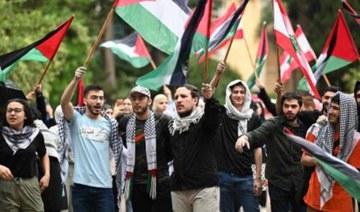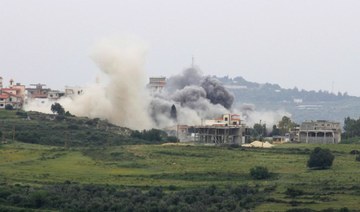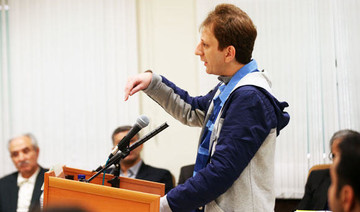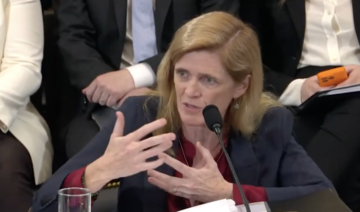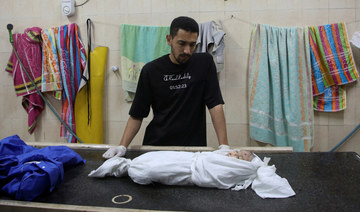GAZA CITY: Israeli air strikes hammered the Gaza Strip pre-dawn Monday, after a week of violence between the Jewish state and Islamist militants left more than 200 people dead as international calls for de-escalation went unheeded.
Overnight Sunday to Monday, Israel launched dozens of strikes in the space of a few minutes across the crowded coastal Palestinian enclave controlled by Islamist group Hamas, according to AFP journalists at the scene.
The strikes caused widespread power cuts and damaged hundreds of buildings, local authorities said. No casualties were immediately reported.
West Gaza resident Mad Abed Rabbo, 39, expressed “horror and fear” at the intensity of the onslaught.
“There have never been strikes of this magnitude,” he said.
In a statement just before 2:00 am (2300 GMT Sunday), the Israeli army said its fighter jets were “striking terror targets in the Gaza Strip.”
Gazan Mani Qazaat said Israeli Prime Minister Benjamin Netanyahu “should realize we’re civilians, not fighters.”
“I felt like I was dying.”
The renewed strikes come a day after 42 Palestinians in Gaza — including at least eight children and two doctors, according to the health ministry — were killed in the worst daily death toll in the enclave since the bombardments began.
In total, 197 Palestinians have been killed in Gaza, including at least 58 children, and more than 1,200 wounded since Israel launched its air campaign against Hamas on May 10 after the group fired rockets. The heaviest exchange of fire in years was sparked by unrest in Jerusalem.
In Israel, 10 people, including one child, have been killed and 282 wounded by rocket fire launched by armed groups in Gaza.
Israel’s army said about 3,000 rockets had been fired since last Monday from Gaza toward Israel — the highest rate ever recorded — but added the Iron Dome anti-missile system had intercepted over 1,000.
Netanyahu said in a televised address Sunday that Israel’s “campaign against the terrorist organizations is continuing with full force” and would “take time” to finish.
The Israeli army said it had targeted the infrastructure of Hamas and armed group Islamic Jihad, including a vast tunnel system, weapons factories and storage sites.
Israeli air strikes also hit the home of Yahya Sinwar, head of Hamas’s political wing in Gaza, the army said, releasing footage of plumes of smoke and intense damage, but without saying if he was killed.
Balls of flame and a cloud of debris shot into the sky Saturday afternoon as Israel’s air force flattened a building housing Al Jazeera and AP news agency, after giving journalists an hour to evacuate.
Netanyahu on Sunday said the building also hosted a Palestinian “terrorist” intelligence office.
“It is a perfectly legitimate target,” he said.
The violence between Hamas and Israel is the worst since 2014, when Israel launched a military operation on the Gaza Strip with the stated aim of ending rocket fire and destroying tunnels used for smuggling.
The war left 2,251 dead on the Palestinian side, mostly civilians, and 74 on the Israeli side, mostly soldiers.
Opening the first session of the UN Security Council on the renewed violence on Sunday, Secretary-General Antonio Guterres called the fighting “utterly appalling.”
“It must stop immediately,” he said.
But the UN talks, already delayed by Israel’s ally the United States, resulted in little action, with Washington opposing a resolution.
President Joe Biden’s administration says it is working behind the scenes and that a Security Council statement could backfire.
Israel is also trying to contain inter-communal violence between Jews and Arab-Israelis, as well as deadly clashes in the occupied West Bank, where 19 Palestinians have been killed since Monday, according to a toll from Palestinian authorities.
Major clashes broke out at the Al-Aqsa mosque compound — one of Islam’s holiest sites — on May 7 following a crackdown against protests over planned expulsions of Palestinians in the Sheikh Jarrah neighborhood of Israeli-annexed east Jerusalem.
Sheikh Jarrah has been at the heart of the flareup, seeing weeks of clashes between Palestinians and Israeli security forces.
On Sunday, a car-ramming attack in Sheikh Jarrah wounded seven police officers, police said, adding that the attacker had been killed.
Police also said “a number of suspects” had been arrested during clashes in another east Jerusalem neighborhood overnight Sunday to Monday.
Guterres warned the fighting could have far-reaching consequences if not stopped immediately.
“It has the potential to unleash an uncontainable security and humanitarian crisis and to further foster extremism, not only in the occupied Palestinian territory and Israel, but in the region as a whole.”
Gaza pummeled by fresh Israeli strikes, more than 200 dead in a week
https://arab.news/974sz
Gaza pummeled by fresh Israeli strikes, more than 200 dead in a week
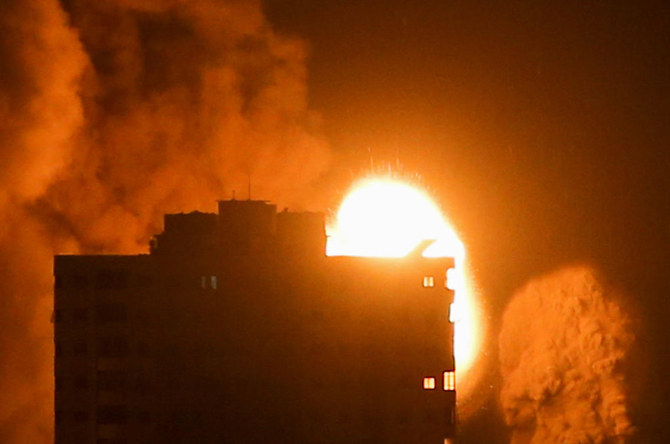
- Overnight Sunday to Monday, Israel launched dozens of strikes in the space of a few minutes across the crowded coastal Palestinian enclave
- The strikes caused widespread power cuts and damaged hundreds of buildings, local authorities said
UNICEF demands immediate ceasefire in southern Lebanon, protection of children

- Israeli airstrikes destroy houses, wounding individuals
- Students from the American University of Beirut and the Lebanese American University called on their administrations “to boycott companies and institutions supporting Israel”
BEIRUT: Lebanon’s Disaster Risk Management Unit announced that the total death toll from Israeli attacks since Oct. 8 has reached 438 people.
According to the latest report issued by the Lebanese Ministry of Health, eight children were among the dead and 75 children were among the 1,359 people injured since the escalation of hostilities.
The UN Children’s Fund expressed its concern over “the continuing hostilities in southern Lebanon that are taking a devastating toll on the population, forcing around 90,000 people, including 30,000 children, from their homes.”
UNICEF called for “an immediate ceasefire and the protection of children and civilians,” and indicated that “the increase in armed conflict has damaged infrastructure and civilian facilities, causing severe damage to basic services that children and families depend on, including nine water stations serving 100,000 people at least.
“More than 70 schools are currently closed, affecting around 20,000 students and significantly affecting their education. Around 23 healthcare facilities — serving 4,000 people — are closed due to the hostilities.”
UNICEF’s representative to Lebanon, Edouard Beigbeder, expressed the organization’s deep concern. “As the conflict impacting the south of Lebanon is in its seventh month, we are deeply alarmed by the situation of children and families who have been forced from their homes and the profound long-term impact the violence is taking on children’s safety, health, and access to education.
“As long as the situation remains unstable to this extent, more children will suffer,” Bigbeder warned. “Protection of children is an obligation under the International Humanitarian Law and every child deserves to be safe.”
In a statement, UNICEF indicated that before the outbreak of the conflict, basic services in Lebanon, including health and education systems, were in danger of collapsing after years of overwork. The unprecedented economic and financial crises that have hit the country since 2019 have exacerbated existing economic vulnerabilities.
Following the displacement of residents from the southern border region, UNICEF, in collaboration with its partners, has been providing “crucial aid to affected families seeking refuge in shelters. Emergency cash assistance, facilitated in partnership with the Ministry of Social Affairs, has been extended to meet the immediate needs of 85,000 individuals. Some displaced children have managed to resume their education in official schools, receiving essential supplies and transportation support.”
On Tuesday, hostilities persisted intermittently on the southern front between Hezbollah and the Israeli military.
An Israeli airstrike targeted a house along the Kafr Kila — Al-Adisa road, destroying it and causing severe damage to nearby properties and homes. Additional Israeli airstrikes struck homes and commercial establishments in the towns of Aita Al-Shaab, Yaroun, Jebbayn, the outskirts of Naqoura, Alma Al-Shaab, and Jabal Al-Labouneh.
In solidarity with Gaza and echoing student activism in US universities, Lebanese university students organized sit-ins on campus or nearby areas, brandishing Lebanese and Palestinian flags and demanding the liberation of Palestine and a cessation of attacks on southern Lebanon.
Students from the American University of Beirut and the Lebanese American University in Beirut called on their administrations “to boycott companies and institutions supporting Israel.”
Similar demonstrations unfolded in several private universities across Lebanon, including Beirut Arab University, Lebanese International University, Saint Joseph University, Haigazian University, and Holy Spirit University of Kaslik.
Iran commutes a tycoon’s death sentence to 20 years in prison
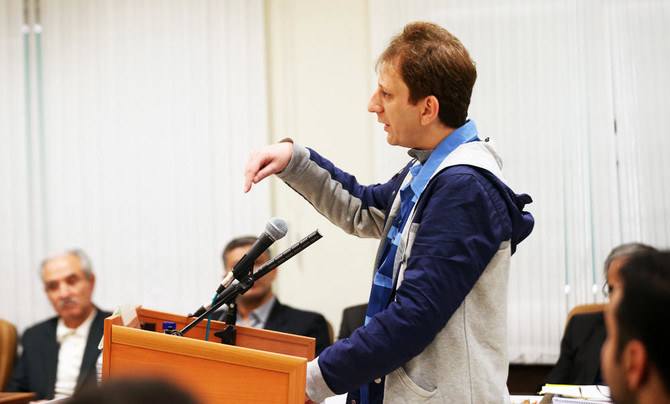
- Babak Zanjani was sentenced to death in 2016 over a number of charges
- An appeal for amnesty by Zanjani was reviewed and his death sentence was “commuted to a 20-year prison term
TEHRAN: Iran’s judiciary said Tuesday that it commuted a death sentence for a tycoon to 20 years in prison after he returned around $2.1 billion in assets from illegally selling oil abroad, the official IRNA news agency reported.
Babak Zanjani, 48, was sentenced to death in 2016 over a number of charges, including money laundering, forgery and fraud that disrupted the country’s economy.
IRNA quoted judiciary spokesman Asghar Jahangir as saying that an appeal for amnesty by Zanjani was reviewed and his death sentence was “commuted to a 20-year prison term after approval by the Supreme Leader.”
Ayatollah Ali Khamenei has the final say on all state matters and occasionally issues pardons.
Jahangir said as part of Zanjani’s 2016 sentence, he had the right to an amnesty or commutation of his death sentence if he returned the assets, compensated for damages and expressed regret for wrongdoing. The spokesman said that Zanjani cooperated with the judiciary to locate the assets abroad in recent years while he was in prison, and all the money was returned.
Zanjani was arrested in 2013 shortly after the election of then President Hassan Rouhani as part of a crackdown on alleged corruption during the rule of former President Mahmoud Ahmadinejad.
Authorities said then that Zanjani owed more than 2 billion euros ($2.1 billion) for oil sales he made on behalf of Ahmadinejad’s government. Zanjani was one of Iran’s wealthiest businessmen, with a fortune worth an estimated $14 billion.
The commutation of Zanjani’s sentence indicates that Iran’s government is in need of revenue after years of US sanctions on the country.
In 2018, then President Donald Trump pulled the US out of a nuclear deal with Iran that had aimed to lift sanctions on Iran in return for the capping of the country’s nuclear activities. Since then, Iran has found it difficult to sell its crude, the country’s main source of foreign revenue. After Trump’s unilateral withdrawal from the deal, Iran’s rial currency tumbled.
In 2014, Iran executed another billionaire businessman, Mahafarid Amir Khosravi, for a $2.6 billion state bank scam in Iran.
UN chief says ‘incremental progress’ toward averting Gaza famine
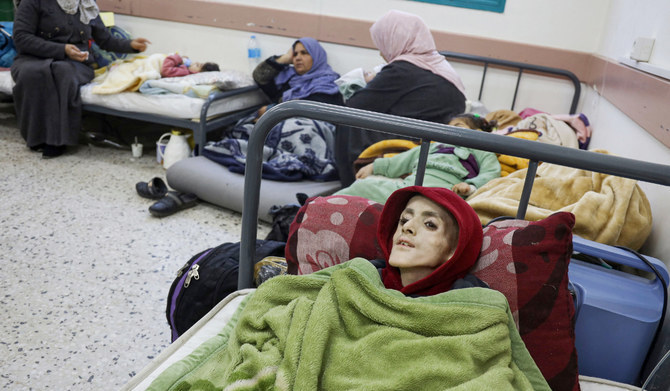
- Guterres said a major obstacle to distributing aid across Gaza is a lack of security for aid workers and civilians
UNITED NATIONS: United Nations Secretary-General Antonio Guterres on Tuesday said there has been “incremental progress” toward averting “an entirely preventable, human-made famine” in the northern Gaza Strip, but much more is urgently needed.
He specifically called on Israel to follow through on its promise to open “two crossing points between Israel and northern Gaza, so that aid can be brought into Gaza from Ashdod port and Jordan.”
Guterres also told reporters that a major obstacle to distributing aid across Gaza is a lack of security for aid workers and civilians.
“I again call on the Israeli authorities to allow and facilitate safe, rapid and unimpeded access for humanitarian aid and humanitarian workers, including UNRWA, throughout Gaza,” he said.
Houthis claim attacking US, Israeli ships
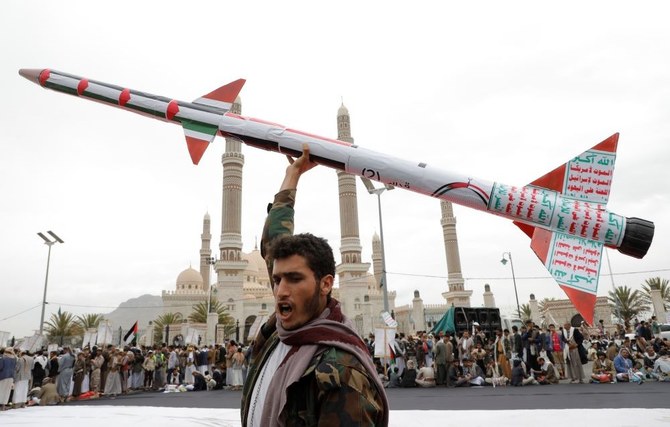
- Houthi military spokesperson Yahya Sarea said that their armed forces launched a number of explosive-laden drones at two US Navy warships in the Red Sea
- Militia also targeted the MSC Orion commercial ship with drones in the Indian Ocean
AL-MUKALLA: Yemen’s Houthi militia has claimed responsibility for four strikes on international commercial and navy ships in the Red Sea and Indian Ocean, including one on a ship destined for Oman.
Houthi military spokesperson Yahya Sarea said on Tuesday that their armed forces launched a number of explosive-laden drones at two US Navy warships in the Red Sea and targeted the MSC Orion commercial ship with drones in the Indian Ocean, which they claimed was related to Israel.
The MSC Orion is a container ship flying the Portuguese flag and traveling from Portugal’s Sines port to Oman’s Salalah port, according to websites that provide information on ship whereabouts and identities.
Oman is one of few nations to host Houthi officials, and its delegations have visited Houthi-controlled Sanaa to push for peace in Yemen.
The Houthis said they also targeted the Cyclades commercial ship for reaching the Israeli Eilat port on April 21, violating earlier instructions to ships in the Red Sea not to go to Israel.
Since November, more than 100 ships sailing in the Red Sea, Bab Al-Mandab Strait, and Gulf of Aden have been attacked by hundreds of drones and ballistic missiles fired by the Houthis in support of the Palestinian people against Israel’s bombardment of Gaza.
The Houthi assaults have prompted the US to organize an alliance of naval task forces and start airstrikes on Houthi-controlled areas of Yemen.
The US Central Command said in a statement that the Houthis fired on Monday three anti-ship ballistic missiles and three drones from areas under their control at the MV Cyclades, which it said is owned by Greece and sails under the flag of Malta, with no reported damage to the ship.
Also on Monday, US CENTCOM forces destroyed one airborne unmanned aerial vehicle launched by the Houthis against the US Navy ships USS Philippine Sea and USS Laboon in the Red Sea.
“There were no injuries or damages reported by US, coalition, or merchant vessels. It was determined the UAV presented an imminent threat to US, coalition, and merchant vessels in the region,” US CENTCOM said.
The EU military operation in the Red Sea, known as the Eunavfor Aspides Operation, said its Fasan frigate shot down one drone on Monday while guarding a commercial ship in the Red Sea from multiple attacks from Houthi-controlled regions of Yemen.
Rashad Al-Alimi, chairman of Yemen’s internationally recognized Presidential Leadership Council, accused the Houthis on Tuesday of not being serious about achieving peace in Yemen and of using the UN-brokered truce to regroup and prepare to restart the war.
In a meeting of Yemen’s military officials in the central city of Marib, Al-Alimi vowed that the Yemeni government would drive the Houthis from the areas under their control, including Sanaa, and thwart their attempts to restart the conflict.
“The Houthi militia has shown that it is not a genuine partner in peacemaking, but rather views peace talks as a kind of deceit and preparation for fresh conflicts,” Al-Alimi said, according to the official news agency SABA.
Hostilities in Yemen’s flashpoints have generally abated since April 2022, when the UN-brokered ceasefire went into effect. The Yemeni government, however, said that the Houthis continue to wage lethal assaults on its troops in Marib, Dhale, Taiz, and other locations, and to mobilize personnel and military equipment outside of contested towns.
Meanwhile, six Yemeni troops were killed and 11 injured on Monday after an improvised explosive device placed by Al-Qaeda militants blew up their vehicle in the Moudia district in the southern province of Abyan.
The targeted troops were members of a military unit allied to the pro-independence Southern Transitional Council, which has been fighting Al-Qaeda in Abyan and Shabwa for months.
Israeli offensive on Rafah is bad idea, French foreign minister tells PM Netanyahu
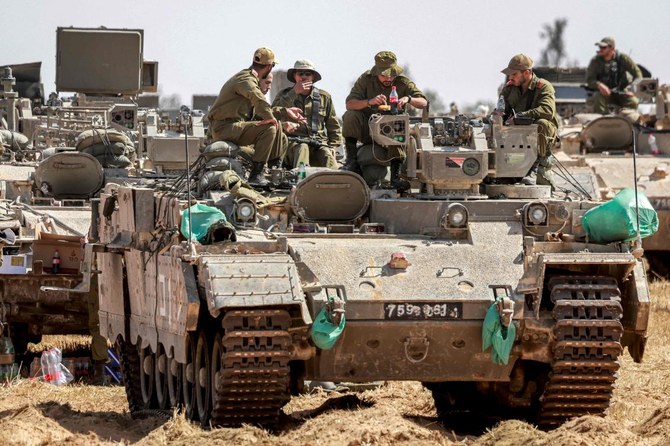
- “There are too many uncertainties over the humanitarian issues,” Stephane Sejourne told Netanyahu
JERUSALEM: An Israeli offensive in Rafah is a bad idea and would not resolve anything in the country’s fight against Hamas, France’s foreign minister told Israeli Prime Minister Benjamin Netanyahu on Tuesday, according to a French diplomatic source.
“It is a bad idea to do it. There are too many uncertainties over the humanitarian issues,” Stephane Sejourne told Netanyahu during a meeting at the prime minister’s office in Jerusalem, the source with direct knowledge of the conversation said.


